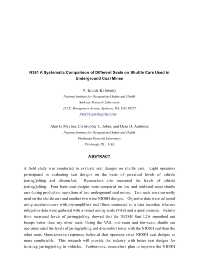Mining Publication: Systematic Comparison of Different Seats on Shuttle Cars Used in Underground Coal Mines
Original creation date: August 2003
A field study was conducted to evaluate seat designs on shuttle cars. Eight operators participated in evaluating seat designs on the basis of perceived levels of vehicle jarring/jolting and discomfort. Researchers also measured the levels of vehicle jarring/jolting. Four basic seat designs were compared on low- and mid-coal seam shuttle cars during production operations at two underground coal mines. Two seats were currently used on the shuttle cars; another two were NIOSH designs. Objective data were collected using accelerometers with preamplifiers and filters connected to a data recorder. Subjective data were gathered with a visual analog scale (VAS) and a questionnaire. Results from measured levels of jarring/jolting showed that the NIOSH seat L2A smoothed out bumps better than any other seats. Using the VAS, mid-seam and low-seam shuttle car operators rated the levels of jarring/jolting and discomfort lower with the NIOSH seat than the other seats. Questionnaire responses showed that operators rated NIOSH seat designs as more comfortable. This research will provide the industry with better seat designs for isolating jarring/jolting in vehicles. Furthermore, researchers plan to improve the NIOSH seats using information gathered in this study.
Authors: NK Kittusamy, AG Mayton, CC Jobes, DH Ambrose
Conference Paper - August 2003
NIOSHTIC2 Number: 20023792
Inter-Noise 2003, 32nd International Congress and Exposition on Noise Control Engineering. West Lafayette, IN: International Institute of Noise Control Engineering, 2003 Aug; :2025-2032
See Also
- A Checklist for Evaluating Cab Design of Construction Equipment
- Experiments on Personal Equipment for Low Seam Coal Miners: IV. Incorporating Coiled Cord Into Cap Lamp Battery Cords
- Field Evaluation of Seat Designs for Underground Coal Mine Shuttle Cars
- Jarring/Jolting Exposure and Musculoskeletal Symptoms among Farm Equipment Operators
- Laboratory Investigation of Seat Suspension Design Performance during Vibration Testing
- Practical Application of a Partial Cab to Reduce the A-Weighted Sound Level at the Operator's Station on Surface Drill Rigs
- Proceedings of the First American Conference on Human Vibration
- Task Analysis
- Transverse-Mounted End-Cab Design for Low-Coal Shuttle Cars
- Whole-Body Vibration Exposure Comparison of Seat Designs for Low- and Mid-Seam Shuttle Cars in Underground Coal Mines
- Page last reviewed: 9/21/2012
- Page last updated: 9/21/2012
- Content source: National Institute for Occupational Safety and Health, Mining Program


 ShareCompartir
ShareCompartir
